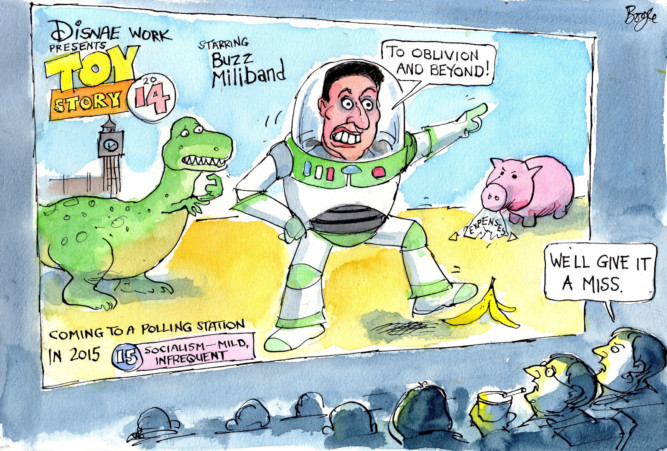
The Labour party is a bit obsessed with buses.
Some of their MPs, it seems, would like to throw Ed Miliband under one. Metaphorically of course.
But those around the leader believe it’s buses that will take them all the way to Downing Street in May.
At Westminster, MPs and media alike, bored with a lack of legislative action, got themselves in an outrageous lather last week about the possibility Ed Miliband may be toppled.
It is nigh on impossible to oust a Labour leader, as the party knows from very recent history when it couldn’t eject Gordon Brown from the driving seat, even though he was plainly on a route that terminated in electoral defeat in 2010.
Miliband will only go if he can be prevailed upon to step down, which seems unlikely since he thinks he’s doing a good job. And to be fair to him there’s evidence to back that up. The polls still put Labour in the lead.
Getting rid of a leader who has kept the party atop the polls non-stop for the last two years would seem an odd decision indeed. Also there’s not that much appetite for actually doing it.
The joke is that, like buses, you wait ages for a Labour plotter to turn up then two turn up at once. Except neither of the Labour MPs allegedly agitating against Ed is willing to go public.
Compare that with the Conservative party. While Miliband has two MPs moaning anonymously David Cameron has seen two of his team cross the floor and join Ukip on the opposition benches.
The facts of the matter didn’t stop a febrile atmosphere developing on Thursday. And while a briefing war went on in Westminster Ed was in the unlikely but strangely appropriate location of a bus garage in Northampton.
Like Miliband, a bus depot is unglamorous and unattractive but functional.
But aside from the similarities between them, Ed’s choice of venue was symbolic of something else. The reason Labour are focusing on buses is because they sum up Ed’s electoral strategy buses mean something to people, political plots do not.
Your Auntie Marj won’t vote for an MP because they overthrew the party leader, but she might vote Labour if they plausibly promise to improve bus services.
The problem is that an alarmingly large chunk of the Labour party don’t get it.
Miliband dumped Mary Creagh from her job as Labour’s transport spokeswoman last week after she failed to get the issue motoring up local agendas.
Ironically she’s joined in her new international development team by someone who had a bit more luck on the buses Anas Sarwar, whose tour of Scotland in the run up to the independence referendum on a big red battlebus proved a triumph.
But nowhere is this lack of comprehension more amply demonstrated than at the media training days one of Ed’s chief spin doctors runs for wannabe MPs.
One of the exercises is to rank potential stories for the amount of coverage they’ll get in the local paper. His job is to drum into these potential parliamentarians that their choice of front page invariably about Israel/Palestine or some such wonky imponderable is wrong and that it’s the bus story that will get them headlines.
This says a lot about Labour’s recruits. Anyone who’d worked in or with local papers, or even just worked and had to get the bus there, would have a better idea what readers and Labour voters want.
It’s this problem at the top that has prompted Labour’s election supremo Douglas Alexander to deploy teams of community activists across the country to focus on local issues that can be converted into votes.
He knows Miliband isn’t charismatic and that some of the politicians can’t connect because they’ve only previously known their patch from the pages of a think tank report.
But he’s hoping voters will put local practicalities and policies ahead of personality when they get to the polling station next May.
If it works it’ll be an open-top bus parade for Labour. Fail and Labour will be bus-ted.

Enjoy the convenience of having The Sunday Post delivered as a digital ePaper straight to your smartphone, tablet or computer.
Subscribe for only £5.49 a month and enjoy all the benefits of the printed paper as a digital replica.
Subscribe